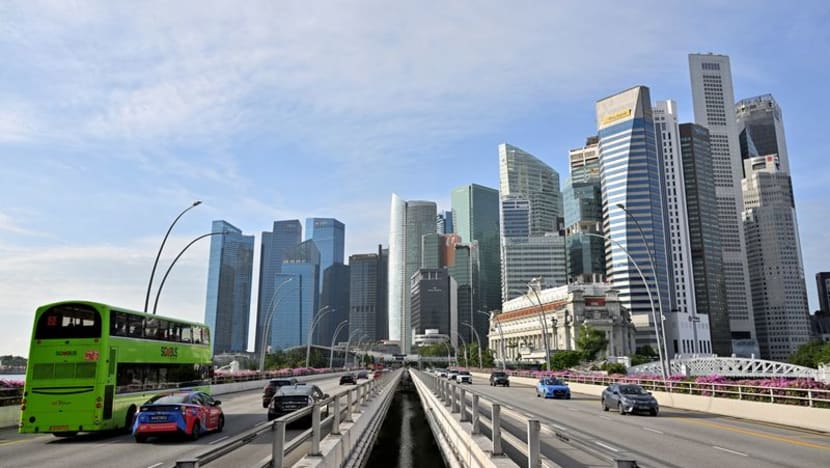Singapore core inflation dips to 2.9% in June; lowest in over 2 years
Core inflation is expected to stay on a gradual moderating trend over the rest of 2024 and step down "more discernibly" in the fourth quarter of the year, said MAS and MTI.

View of the skyline in Singapore on Jan 27, 2023. (File photo: REUTERS/Caroline Chia)

This audio is generated by an AI tool.
SINGAPORE: Singapore’s core inflation in June dropped to 2.9 per cent year-on-year - the lowest in more than two years.
June's figure - a dip from May's 3.1 per cent and slightly lower than the 3.0 per cent forecast in a Reuters poll of economists - equalled the core inflation registered in March 2022.
The decrease was driven by lower inflation for retail and other goods, as well as services, according to data from the Monetary Authority of Singapore (MAS) and the Ministry of Trade and Industry (MTI) on Tuesday (Jul 23).
On a month-on-month basis, core inflation - which excludes accommodation and private transport - was unchanged from May.
Overall or headline inflation in May was 2.4 per cent in June on a year-on-year basis, down from 3.1 per cent in the previous month.
"The slowdown was largely due to a decline in private transport costs, in addition to lower core inflation," MAS and MTI said.
On a month-on-month basis, headline inflation decreased by 0.2 per cent.
Private transport inflation fell from 2.8 per cent to -0.7 per cent in June as the prices of cars and motorcycles declined. Petrol prices also rose at a slower pace.
Retail and other goods inflation decreased to 0.5 per cent from 1.5 per cent in May because of the prices of medicines and health products and personal effects recording smaller increases, while the prices of clothing and footwear fell more steeply.
Services inflation dipped to 3.4 per cent in June from 3.6 per cent the month before, due to the "slower pace of increase in the cost of hospital services and holiday expenses.", said MAS and MTI.
Accommodation inflation also edged down as housing rents rose at a more modest pace, going from 3.4 per cent in May to 3.3 per cent in June.
Food inflation stayed at 2.8 per cent, reflecting stability in the inflation of food services, MAS and MTI said.
Electricity and gas inflation also stood unchanged at 6.9 per cent as prices rose at a steady pace.
OUTLOOK
The authorities noted that the global prices of energy and most food commodities have remained relatively stable in recent months.
"The costs of Singapore’s imported intermediate and final manufactured goods have also continued on a broad decline," MAS and MTI said.
"Inflation for services associated with overseas travel should moderate further over the course of the year as the air transport and hospitality sectors around the world restore supply."
The "gradually strengthening" Singdollar trade-weighted exchange rate should also continue to temper Singapore's imported inflation in the months ahead.
Within Singapore, increases in unit labour costs have slowed in tandem with the cooling labour market.
Businesses are still likely to continue passing through the earlier increases in labour and other business costs to consumer prices, albeit at a reduced pace, said MAS and MTI.
Core inflation is expected to stay on a gradual moderating trend over the rest of 2024 and step down "more discernibly" in the fourth quarter of the year, as import cost pressures continue to decline and tightness in the domestic labour market eases further.
Private transport inflation is expected to moderate from last year amid the larger projected COE supply, while accommodation inflation should also continue to ease as the supply of housing units available for rental increases over the course of the year.
The authorities projected core inflation to average 2.5 per cent to 3.5 per cent for 2024.
Excluding the transitory effects of the GST increase, core inflation are expected to come in at 1.5 per cent to 2.5 per cent.
"The forecast range for CPI-All Items inflation is being reviewed and will be updated in MAS’ July 2024 Monetary Policy Statement," said MAS and MTI.
Risks to the inflation outlook remain, as fresh geopolitical shocks, adverse weather events and renewed transportation disruptions around the world could put "upward pressure" on global energy and food commodity prices, as well as shipping costs, they added.
"Domestically, a stronger-than-expected labour market could lead to a re-acceleration of wage growth. Conversely, an unexpected weakening in the global economy could induce a greater easing of cost and price pressure."













